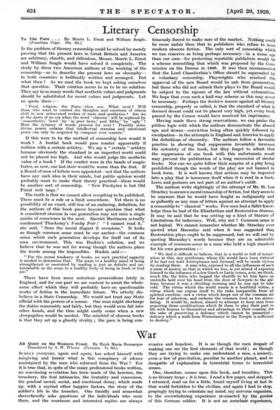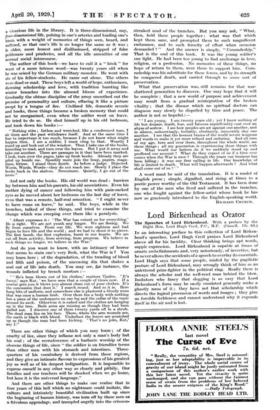War
All Quiet on the Western Front. By Erich Maria Remarque Translated by A. W. Wheen. (Putnam. 7s. 6d.) SURELY everyone, again and again, has asked himself with misgiving and horror what is this conspiracy of silence maintained by the men who returned from the War For it is true that, in spite of the =my professional books written, no convincing revelation has been made of the heroism, the treachery, the foul intimacies, the brutality and coarseness, the gradual moral, social, and emotional decay, which made up, with a myriad other happier factors, the story of the soldier's life in the trenches. One timidly and somewhat shamefacedly asks questions of the individuals who were there, and the courteous and interested replies are always
evasive and hopeless. It is as though the men despair of making one see the first elements of that world ; as though they are trying to make one understand a race, a scenery, even a law of gravitation, peculiar to another planet, and so incapable of explanation in terrestrial terms to terrestrial senses.
One, therefore, comes upon this book, and trembles. This is no literary trope ; it is true. I read a few pages, and stopped. I returned, read on for a little, found myself living at last in that world forbidden to the civilian, and again I had to stop, gropingly trying to orientate my mind, my nervous organism, to the overwhelming experience re-enacted by the genius of this German soldier. It is not an armchair experience,
g vicarious life in the library. It is three-dimensional, nay, pier-dimensional life, pulsing in one's arteries and loading one's brain with a weight of memories of things seen, heard, and suffered, so that one's life is no longer the same as it was ; Is older, more honest and disillusioned, stripped of false politeness and pruderies, and all the idle amenities of our normal social intercourse.
The author of this book—we have to call it a " book " for want of a more intense word—was twenty years old when he was seized by the German military monster. He went with six of his fellow-students. He came out alone. The others were dead or mad. These boys left a world of hope, enthusiasm, dawning scholarship and love, with tradition bursting like winter branches into the almond bloom of experience. Gradually the obtuse discipline of the army smoothed out the promise of personality and culture, effacing it like a picture swept by a tongue of fire. Civilized life, domestic reverie and books, these things became a broken memory that could not be reorganized, even when the soldier went on leave. He tried to do so. He shut himself up in his old bedroom, and took down his books :- " Nothing stirs ; listless and wretched, like a condemned man, I sit there and the past withdraws itself. And at the same time I fear to importune it too much, because I do not know what might happen then. I am a soldier, I must cling to that. Wearily I stand up and look out of the window. Then I take one of the books, intending to read, and turn over the leaves. But I put it away and take out another. There are passages in it that have been marked. I look, turn over the pages, take up fresh books. Already they are piled up beside me. Speedily more join the heap, papers, maga- zines, letters. I stand there dumb. As before a judge. Dejected. Words, Words, Words—they do not reach me. Slowly I place the books back in the shelves. Nevermore. Quietly, I go out of the Mom."
And not only the books. His old world was dead : barriers lay between him and his parents, his old associations. Even his mother dying of cancer and following him with pain-racked eyes as he moved about her bedroom on the last day of leave, even that was a remote, half-real sensation. " I ought never to have come on leave," he said. The boys, while in the trenches, talked of these things, and tried to examine the change which was creeping over them like a paralysis.
" Albert expresses it : The War has ruined us for everything.' He is right. We are not youth any longer. We are fleeing. We fly from ourselves. From our life. We were eighteen and had begun to love life and the world ; and we had to shoot it to pieces. The first bomb, the first explosion, burst in our hearts. We are cut off from activity, from striving, from progr as. We believe in such things no longer, we believe in the War.'
And do you want to know, with an intimacy of horror that seems to stain one's very flesh, what the War is ? You may learn here ; of the degradation, of the treading of blood and filth and poison, of the unceasing din that shakes a soul out of life into death. You may see, for instance, the wounds inflicted by trench mortars :- "' He's been blown out of his clothes,' mutters Tjaden. ' It's funny,' says Kat, we have seen that a couple of times now. If a mortar gets you it blows you almost clean out of your clothes. It's the concussion that does it.' I search round. And so it is. Here hang bits of uniform, and somewhere else is plastered a bloody mess that was once a human limb. Over there lies a body with nothing but a piece of the underpants on one leg and the collar of the tunic around its neck. Otherwise it is naked and the clothes are hanging up in the tree. Both arms are missing as though they had been pulled out. I discover one of them twenty yards off in a shrub. The dead mar} lies on his face. There, where the arm wounds are, the earth is black with blood. Underfoot the leaves are scratched up as though the man had been kicking. That's no joke, Hat,' say I."
There are other things of which you may learn ; of the cruelty of lice, since they inflame not only a man's body but his soul ; of the recrudescence of a barbaric worship of the obscene things of life, since " the soldier is on friendlier terms than other men with his stomach and intestines. Three- quarters of his vocabulary is derived from these regions, and they give an intimate flavour to expressions of his greatest joy as well as of his deepest indignation. It is impossible to express oneself in any other way so clearly and pithily. Our families and our teachers will be shocked when we go home, but here it is the universal language."
And there are other things to make one realize that in four years of this hell which no nightmare could imitate, the culture and intricately beautiful civilization built up since the beginning of human history, was torn off by these men as a frivolous appendage, and trampled angrily into the crimson.
streaked mud of the trenches. But you may ask, " What, then, held these people together : what was that which kept them sane, and prompted them to such magnificent endurance, and to such ferocity of effort when occasion demanded ? " And the answer is simply, " Comradeship." That is the soul of this book. It was the young soldier's one light. He had been too young to find anchorage in love, religion, or a profession. No memories of these things, no hope of return to them, were there to support him. Com- radeship was his substitute for these forces, and by its strength he conquered death, and carried through to some sort of preservation.
What that preservation was, still remains for that war- shattered generation to discover. One may hope that it will
be complete ; that a new world of purpose and achievement may result from a gradual reintegration of the broken vitality ; that the disease which no spiritual doctors can diagnose may slowly be dispelled by time and peace. The author is not so hopeful.:—
" ' I am young. I am twenty years old ; yet I know nothing of life but despair, death, fear, and fatuous superficiality cast over an abyss of sorrow. I see how peoples are set against one another, and in silence, unknowingly, foolishly, obediently, innocently slay one another. I see that the keenest brains of the world invent weapons and words to make it yet more refined and enduring. And all men of my age, here and over there, throughout the whole world, see these things ; all my generation is experiencing those things with me. What would our fathers do if we suddenly stood up and proffered our account ? What do they expect of us if a time ever comes when the War is over ? Through the years our business has been killing ; it was our first calling in life. Our knowledge of life is limited to death. What will happen afterwards ? And what shall come out of us ? ' " A word must be said of the translation. It is a model of
English prose ; simple, dignified, and rising at times to a poetic power worthy of the Old Testament. It has been done by one of the men who lived and suffered in the trenches, one who fought against the fellow-artist whose book he has now so graciously introduced to the English-speaking world.
RICLIARD Ciluacif.

























































 Previous page
Previous page